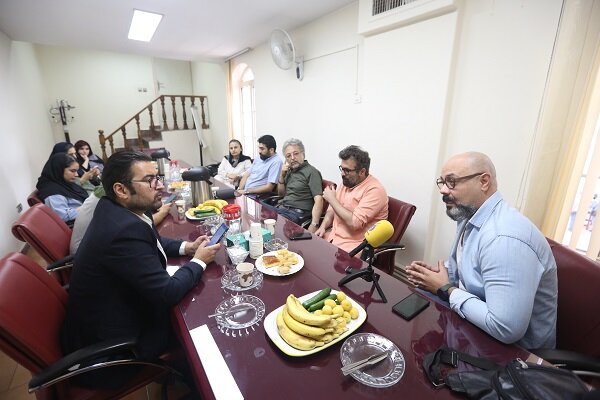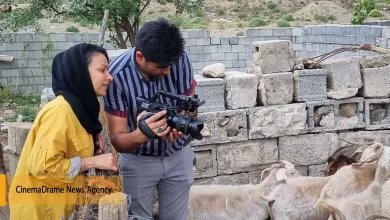Board of Directors of the Association of Documentary Filmmakers: We Must Find a Path to Independence for Documentary Cinema!

According to cinemadrame news agency, the Board of Directors of the Association of Documentary Filmmakers emphasized the position of documentary cinema and the need to find a path to its independence. They announced that a resolution by the previous government’s cabinet regarding the professional documentation of national projects, through the launch of a system including the names of documentary filmmakers, is soon to be implemented.
On Monday morning (June 10), the Board of Directors of the Association of Documentary Filmmakers held a press conference. While emphasizing the importance and position of documentary cinema and the profession of documentary filmmaking in all areas of society, they discussed the lost and neglected identity of this branch of cinema in the current era and explained the programs they have prepared in areas such as screening and education.
The meeting was attended by Mehrdad Zahedian (Chairman of the Association), Hadi Masoumdoost (Vice Chairman), Parisa Eshghi (Secretary), Ali Hamraz (Treasurer), and Meysam Shahbabayi (Board Member). One of the issues they emphasized was the position of the guild and the equal value of members’ presence within it, which gives such a guild the power to act and dynamism.
In this regard, Parisa Eshghi stated: “Looking back at the history of cinema, we see that documentary films have played an important role in shaping the overall body of cinema. Documentary cinema is nourished by the foundation of thought, and if individuals are allowed to pursue their path based on thought, documentary cinema will grow even more.”
Pursuing Independence and Creating a Kind of Privatization in Documentary Cinema
It was also recalled that a good documentary can have significant impacts in various fields, such as Farhad Varahram’s documentary “Unidentified,” which was about the registration of children in Sistan and Baluchestan and was pursued in parliament.
In this regard, Eshghi expressed hope that even if it’s a trickle, more space will be provided for good work to be done, to illuminate a path that has been dormant for some time, even though there are not many tools at hand.
Another topic raised at the meeting was the Board of Directors’ effort to achieve a kind of independence in the work of documentary filmmakers.
Meysam Shahbabayi explained: “We have an ideal in mind, which is actually our goal for coming together in the sixteenth term of the Board of Directors, based on the trust of 350 association members; that is, to create independence for the documentary cinema movement so that a kind of privatization can take shape, and the level of documentary cinema reaches a point where its connection is not limited only to government sectors.”
Complaints about Excessive Red Tape and Centers That Gain Ownership of Films Through Financial Support
Ali Hamraz, noting that lobbying various centers is one of the guild’s duties, continued: “Unfortunately, the importance and position of documentary cinema are not valued, and everything remains at the level of words. The (government) centers active in this field do not act as foundations, unlike other parts of the world; on the contrary, they gain ownership of films through financial support. This is while in documentary filmmaking, whatever you spend is spent on the film itself. Of course, this method, where an entity like the Center for the Development (of Documentary, Experimental, and Animation Cinema) does not act like a foundation, is not related to the managers, but rather the system operates in this way. Besides this issue, the red tape is so extensive that it makes it difficult to easily send documentaries to various televisions, which in turn makes private investment in documentary production difficult because no money is returned.”
In response to how this independence – apart from the financial aspect – can be achieved in terms of content, he said: “Independence is relative, but unfortunately, there isn’t much trust here, and if there is a trust-based approach to content, then subtle social expression becomes different from ‘blackwashing’ [presenting a negative and distorted image].”
Planning in the Documentary Film Screening Working Group
In another part of the meeting, he stated that a screening working group has been defined within the Board of Directors, and the effort during the Board’s five months in office has been to manage things more methodically.
Hamraz added: “We are seeking to create more space in the private sector for film screenings, especially since they also sell tickets. In this section, consultations are also being held with platforms because these platforms can make good use of narrative documentary cinema.”
In this regard, Zahedian emphasized: “We are trying to promote the culture of watching documentaries, and even in terms of regulations, we must look for solutions to create more screening platforms.”
He further added that the association is striving to achieve a stable path and is also seeking to establish a support fund.
Masoumdoost, in line with the importance of narrative documentary cinema, stated: “Documentary cinema has always been treated as if it’s only used for variety (of films) and has been, in a way, just an adornment for gatherings. What share of the cinema budget is actually allocated to documentaries? Why is there still a secondary view of documentaries in practice?”
He criticized the misuse of a documentary film’s sales figures to diminish the importance of documentary cinema itself and added: “Why should there still be a traditional view on this matter?”
At the meeting, it was also mentioned that the Board of Directors has planned four types of film screening programs, one of which is the screening of documentaries at the Cinema House; a collection of screenings of prominent films that are not easily accessible and for which a panel discussion is planned; another series of screenings will be held jointly with Bukhara Magazine, where one night each month until the end of the year will be dedicated to a type of documentary; and the last method is in the international section, where the screening of documentary films will be facilitated in a targeted manner based on specific topics and in cooperation with centers such as universities.
What Happened to the Cabinet Resolution for Documenting National Projects?
Later in the meeting, the previous government’s cabinet resolution for the production of documentaries on national projects by professional documentary filmmakers was recalled. Zahedian, in response to ISNA about the latest status of this resolution’s implementation, said: “The cabinet resolution had been pending, and the Board of Directors of the association, as a first step, followed up on this issue because it helps strengthen the financial base of documentary filmmakers. According to the Center for Development, the system related to this resolution, announcing the names of documentary filmmakers, will be launched in the next week or two. With the cooperation of documentary filmmakers and the Center for Development, the system will begin to operate, and the public relations departments of various agencies are obliged to entrust the documentation of national projects to the documentary filmmakers introduced in this system.”
Masoumdoost also commented in this section that this resolution might not be very promising in practice and that corruption might arise, stating: “We have more than 30,000 national projects, and if this resolution is implemented, all members of the two official documentary cinema associations can be employed in several projects.”
It was recalled here that overall, this resolution has a grand title that benefits managers more.
Masoumdoost further stated: “The duty of the guild is to demand and gain the support of its members. In this guild, we have never had passive members, and documentary filmmakers are among the few guilds that have high expectations and a powerful presence. Of course, it is also an important point that the more our members are connected to government centers, the more hesitant they become with them. Our power comes from within ourselves.”
In this context, it was recalled that after years, the issue of registering Cinema House has still not been properly resolved and has even caused divisions.
Artificial Intelligence and Documentary Filmmaking
In another part of the meeting, the use of artificial intelligence technology was mentioned, stating that this trend can be both constructive and toxic. There was even a reference to the release of old photos from the Golestan Palace archives, which documentary filmmakers previously faced strange encounters and many complexities each time they wanted to see the photos. It was expressed with joy that these photos, which can now be turned into films with a fictional design using AI, have finally been released from the control of Golestan Palace.
Eshghi emphasized that necessary training should be provided, and its prerequisites will be arranged.
Subsequently, Shahbabayi stated: “We are forced to accept change for cinema to survive, and in this regard, we had discussions with some faculty members of the Art University to provide conditions for experience transfer and training.” /ISNA




